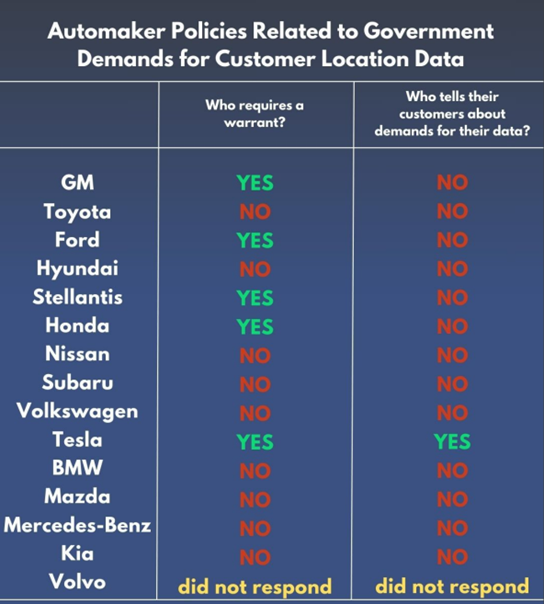Father
Professional
- Messages
- 2,602
- Reaction score
- 837
- Points
- 113
The investigation showed how cars leak information about their owners.
The US Congress has released the results of an investigation, according to which most major automakers hand over drivers ' location data to the police without a court warrant, despite public promises to refrain from such actions.
Of the 14 automakers surveyed, only 5 (GM, Ford, Honda, Stellantis, and Tesla) require a warrant or court order to provide such information, and only Tesla notifies customers of law enforcement requests.
In response to the senators request, submitted through an unspecified automobile industry association, Volvo did not provide information. Industrial giants Toyota, Nissan, Subaru, Volkswagen, BMW, Mazda, Mercedes-Benz and Kia have admitted that data transfers only require a subpoena, which does not require the approval of a judge.

Volkswagen said it requires a warrant to disclose location data for a period of more than 7 days, but will disclose the information in 6 days or less on a subpoena. Volvo, owned by China's Geely, did not comment.
Senators Ron Wyden and Ed Markey, who are actively involved in the issue, sent a letter to the Federal Trade Commission (FTC) demanding to open an investigation into the misleading statements of automakers and their data storage practices. According to the senators,
Automakers "not only left consumers in the dark about their actual practices, but many of them misled customers by failing to comply with the industry's voluntary privacy guidelines," the letter notes. The industry organization Alliance for Automotive Innovation highlighted automakers commitment to protecting sensitive vehicle location data.
However, according to Wyden, the data was obtained directly from automakers, which casts doubt on the transparency of their statements. A spokesperson for the association did not respond to a request for comment.
Mercedes-Benz claims that the company "does not systematically collect historical data about the location of cars," while Hyundai admits that it "usually" stores such data for up to 15 years, Toyota for up to 10 years, and Honda for up to 7 years.
Car location data can reveal intimate aspects of a person's life, including visits to various medical institutions and participation in protests, which puts citizens ' rights and freedoms at risk.
The US Congress has released the results of an investigation, according to which most major automakers hand over drivers ' location data to the police without a court warrant, despite public promises to refrain from such actions.
Of the 14 automakers surveyed, only 5 (GM, Ford, Honda, Stellantis, and Tesla) require a warrant or court order to provide such information, and only Tesla notifies customers of law enforcement requests.
In response to the senators request, submitted through an unspecified automobile industry association, Volvo did not provide information. Industrial giants Toyota, Nissan, Subaru, Volkswagen, BMW, Mazda, Mercedes-Benz and Kia have admitted that data transfers only require a subpoena, which does not require the approval of a judge.

Volkswagen said it requires a warrant to disclose location data for a period of more than 7 days, but will disclose the information in 6 days or less on a subpoena. Volvo, owned by China's Geely, did not comment.
Senators Ron Wyden and Ed Markey, who are actively involved in the issue, sent a letter to the Federal Trade Commission (FTC) demanding to open an investigation into the misleading statements of automakers and their data storage practices. According to the senators,
Automakers "not only left consumers in the dark about their actual practices, but many of them misled customers by failing to comply with the industry's voluntary privacy guidelines," the letter notes. The industry organization Alliance for Automotive Innovation highlighted automakers commitment to protecting sensitive vehicle location data.
However, according to Wyden, the data was obtained directly from automakers, which casts doubt on the transparency of their statements. A spokesperson for the association did not respond to a request for comment.
Mercedes-Benz claims that the company "does not systematically collect historical data about the location of cars," while Hyundai admits that it "usually" stores such data for up to 15 years, Toyota for up to 10 years, and Honda for up to 7 years.
Car location data can reveal intimate aspects of a person's life, including visits to various medical institutions and participation in protests, which puts citizens ' rights and freedoms at risk.

